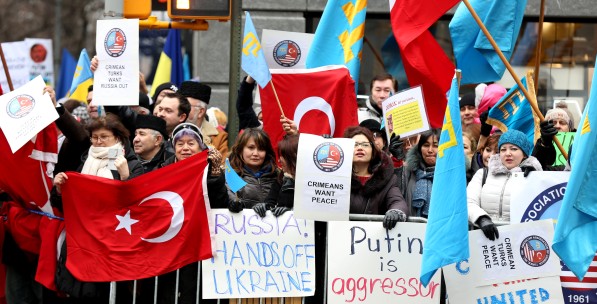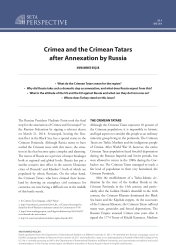The Russian President Vladimir Putin took the final step for the annexation of Crimea and Sevastopol to the Russian Federation by signing a relevant decree on March 21, 2014. Sevastopol, hosting the Russian fleet in the Black Sea, has a special status in the Crimean Peninsula. Although Russia seems to have settled the Crimean issue with this move, the situation in fact has become quite complex and alarming. The moves of Russia are a preview of major breakages both at regional and global levels. Russia has put a similar scenario into effect in the eastern Ukrainian cities of Donetsk and Kharkov, both of which are populated by ethnic Russians. On the other hand, the Crimean Tatars, who have claimed their homeland by showing an exemplary civil resistance for centuries, are now facing a difficult test in the middle of this battle royale.
Although the Crimean Tatars represent 10 percent of the Crimean population, it is impossible in historic and legal aspects to consider this people as an ordinary minority group living in the peninsula. The Crimean Tatars are Turkic Muslims and the indigenous people of Crimea. After World War II, however, the entire Crimean Tatar population faced forceful deportation during the Russian Imperial and Soviet periods, but were allowed to return in the 1980s during the Gorbachev era. The Crimean Tatars managed to reach a fair level of population in their very homeland, the Crimean Peninsula.
After the establishment of a Turko-Islamic civilization by the state of the Golden Horde in the Crimean Peninsula in the 13th century, and particularly after the Golden Horde’s downfall in the 16th century, the Crimean Khanate dominated the Black Sea basin and the Kipchak steppes. As the successors of the Crimean Khanate, the Crimean Tatars suffered many wars, genocides and forced deportations. The Russian Empire annexed Crimea nine years after it signed the 1774 Treaty of Küçük Kaynarca. Muslims living in the Crimean Khanate, which had stretched from modern-day Romania to the Caucasus beyond the Crimean Peninsula, were subjected to a great deal of oppression following the annexation. The Crimean War, which took place from 1853 to 1856, was an important turning point for the Crimean Tatars.




